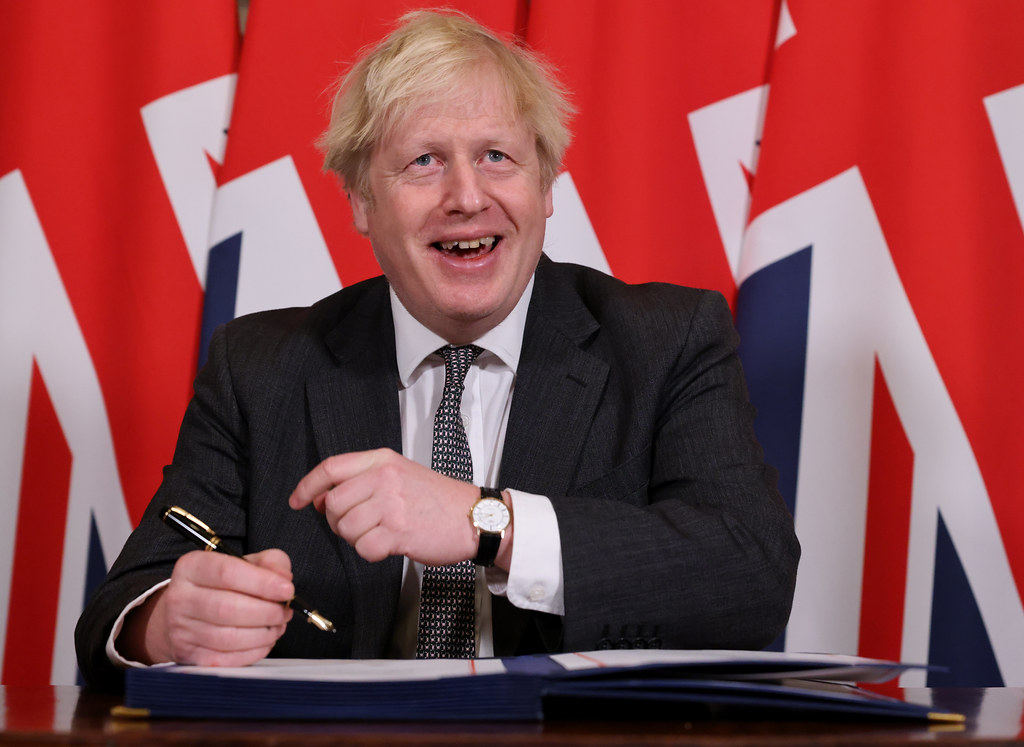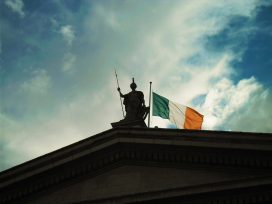Gerry Hassan: We are living at a time when the past, and interpretations, memories and ghosts of the past, seem all around us within the UK. Different versions of the past are central to our politics, to our ‘culture wars’, and to the legacy of Empire and the UK’s colonialism and imperialism. Of course these discussions are not just about the past. They bear directly on the present and future, and whether or not there is any prospect of the UK escaping the shadow of being an Empire state.
I want to start this conversation with your book On Living in an Old Country (1985), which hugely influenced my take and understanding of Britain and what it is, and to grasping the way in which the past is a living set of collective memories being constantly remade. I take from your book that you are writing about two territories – England and the idea of Britain. These have at times been presented as effortlessly synonymous and overlapping; but increasingly in recent times this has come to be seen as problematic, filled with tensions and untenable – to the extent that the fault-lines between the two now constitute a major fissure running through British politics and the British state.
What originally drove you to writing the book and its central theses? And what does it say that endures through the years since the original book was first published in 1985? Finally, thirty-five years on – after Thatcher, Blair and New Labour, ten years of Conservatives and austerity, Brexit and now COVID-19 – where would you say we are now? What does the notion of ‘on living in an old country’ mean today, and whose country and which country are we talking about?
Patrick Wright: Thank you for remembering this book, which I wrote in a spirit of alienated familiarity after returning to England in 1979, having spent the best part of five years hanging around English Departments in Vancouver. While still in Canada I had started thinking about the ways in which the British state clothed itself in synthetic ideas of national and imperial tradition. I was partly spurred into reflection by the glaring disconnect between Anglo-Canadian ideas of ‘the old country’ and the disintegrating Britain I had known as a student in the early 1970s, not least during the three years (1970-73) I spent at the University of Kent at Canterbury – one of the so-called ‘new universities’ which had quickly come to feel, in those years of turmoil and crisis, less like the building site it actually was and more like the ruin of a promised future that was already collapsing all around us.
When I came back to England, I had this useful sense of separation, which became central to the book’s perspective and, I hope, to its strengths as well as its weaknesses. I had returned to England with the aim of pursuing the project as a doctoral thesis at the Centre for Contemporary Cultural Studies at the University of Birmingham. Without funding, however, the book was written when I was making a living doing other things. For these reasons, it was a series of loosely connected essays, many focused on suggestive but conventionally overlooked manifestations; the whole thing threaded together with the help of a more or less adequate theoretical perspective and by various strategies of assertion and accusation.
Even I have tired of hearing On Living in an Old Country counted among the books that launched the critique of ‘the heritage industry’; I was definitely not trying to contribute to a yet to be invented field known as ‘Museum Studies’. The question for me, as we watched Margaret Thatcher get into her stride, was to understand how a selective idea of national tradition had become the willing and able attendant to a disruptive political project that was, in so many ways, fundamentally destructive of tradition. How did this idea serve to legitimize the deindustrializing ‘modernization’ that was being pursued then? What was it that made ‘the past’ so compelling in people’s understanding, and what were the consequences of invoking a unified and ‘organic’ conception of the national heritage in an increasingly various and also polarized society?
I looked for others who had written about this sort of ‘nationalism’ but found precious little. Hobsbawm and others had given us ‘the invention of tradition’, which was definitely helpful. Yet much of the academic research of that time seemed content with the idea that ‘nationalism’ was really only significant as a ‘third world’ development project. I went elsewhere for thoughts about the ways in which ideas of tradition articulated aspects of everyday life; this seemed a key thing to understand if we were to get beyond thinking that, for superior truth to prevail, it might be enough to show up the falsification – the ‘inventedness’ – in popular conceptions of history.
I had also read Tom Nairn, on Powellism and the case for a new articulation of England, in The Break-Up of Britain, a book from which I could and probably should have learned more, and also his essay (in Bananas magazine) on the English literary intelligentsia. Some Scottish critics, including Angus Calder, who reviewed it in Cencrastus, were kind about On Living in an Old Country, but it was obvious, even then, that it was far from ideal to write on this subject from English experience alone.

Boris Johnson signing the Brexit Trade Deal on 30 December 2020. Picture by Andrew Parsons.
I wanted to expose some of the murkier aspects of inherited ideas of English identity, but I also remember feeling some tension between the direction Nairn was indicating – the break-up scenario – and the other requirement of the time, which was to find ways of defending the softer educational and welfarist elements of the British state that were faced with aggressive ideological attack, privatization, etc. In the end, though, I had to go with what I had. On Living in an Old Country was really an incomplete act of ‘reconnaissance’ of a terrain I continued to explore in subsequent books, and to which I have recently returned while writing The Sea View Has Me Again during the years in which Brexit became a reality.
Gerry Hassan: The role and power of the past seems everywhere in Britain today – and ever more powerful and all-encompassing. It is not just the Blitz spirit (which Angus Calder was trying to demythologize nearly thirty years ago in The Myth of the Blitz), the Battle of Britain and Dunkirk spirit that are regularly commemorated, but also older military triumphs – Trafalgar, Waterloo. The continued love of heritage and reproduction and repacking of Britain’s past and its upper classes – Downton Abbey and more – is not only popular in the UK but travels and sells well as an overseas picture of Britain.
This is related to David Andress’s point about the rise of singularity in interpreting the past and the present. And here one vivid and telling cultural example is the work of Dominic Sandbrook, and in particular his history of popular culture, The Great British Dream Factory, which poses the ‘national imagination’ as singular, and completely writes out the counter-stories and disruptions of the 1950s, 1960s and 1970s;
Sandbrook also treats a selective, very white, England as Britain, and the UK as a ‘cultural superpower’ – all in the pursuit of continuing the lexicon of greatness. So, this is no innocent guilty pleasure: it’s about who is telling and retelling national stories, the nations, communities and voices that are being amplified and those left out, and the consequences which flow from this – which are about cultural closure, power and privilege. This is a very narrow cultural and political account of a very selective, white, middle and upper-class southern England.
For many who are attached to this singular view of England and Britain, critiques of Empire and slavery are also unwelcome, although this is a field that does at least involve some contestation and challenge to dominant accounts – a challenge that has greatly intensified during 2020. In the UK of today, Empire and its legacies seem all around us, and are recognised as part of the foundational stories of UK by both reactionaries and the left; the power of these and their place has been challenged by a number of forces including Black Lives Matter. Our conversation today is mainly focused on the Empire state in as much as it relates to ideas about modernity, and the relationships between the separate countries of the UK, but clearly the battle over how we remember the Empire is also an important part of the wider contestation over the meanings of Britishness and Englishness.
What do you think is going on with this rise and grip of a very selective, even triumphalist, past on the right – something you foretold in On Living in an Old Country? How is it to be understood, what does it say about the present, and is there any realistic escape from it?
Patrick Wright: I agree that these laundered and scissored versions of ‘history’ may indeed lead to what David Andress has described as ‘cultural dementia’ – an even worse condition, perhaps, than Paul Gilroy’s ‘post-colonial melancholia’! Both of these ailments seek to make us patriots of a land that never was. And that, remarkably, appears to be exactly the goal of the Department of Education’s outrageous new guidance seeking to outlaw anti-capitalist argument from schools as ‘extreme’. In the English case, this sort of thinking has already proved capable of unifying a large section of the country but only by turning it into the dying and defeated land commemorated in accusing elegies of the kind Roger Scruton used to write: an expiring realm which has more recently been shocked back into a semblance of life by magical-political means during the Brexit campaign.
Expatriate overseas images of Britain have indeed continued to prove potent in this situation – whether in repatriated examples like Downton Abbey, or in the afterlife of older propaganda films like Mrs Miniver (1942) made to project an image of England that would encourage American efforts in the Second World War. Such images have also featured in the childhood experiences of Afro-Caribbean immigrants, who have described being raised with a schoolroom idea of Britain as the Mother of Parliaments, etc, and then finding themselves in a very different country when they got beyond the passenger terminal at Tilbury.
People entering the UK from the Caribbean and other once colonial locations may have experienced a shattering of illusions, but, as I discovered in Canada, much expatriate memory of Britain manages to avoid confrontation with present reality. In its own disconnected way, expat memory operates by timeslip and the fact that it misses out many decades of recent history can make it a useful tool for those who think the country has spent those decades going to the dogs. That is how it served the large-circulation ‘heritage’ magazine This England in the last years of the twentieth century.
The habit of this magazine, which found its readers at home as well as in expatriate circles abroad, was to pile up accusations, which were none the less existent for often being implicit rather explicit, about immigration and the other perceived post-war evils thought to be encroaching on the national landscape. There are expatriates of the imagination too, and you don’t have to cross oceans to find them. I remember thinking that Margaret Thatcher’s Secretary of State for Education, Kenneth Baker, was behaving like one when he brought his Faber Book of English History in Verse (1988) to a sudden halt at the Coronation on Elizabeth 1, as if everything after 1953 was best ignored. That sort of timeslip fantasy surely also shapes the imagination of Brexiters such as Daniel Hannan.

This article was originally published by Eurozine partner journal Soundings (UK). Their 1/2021 issue discusses post-WWII British memory politics and left nationalism. Read our review here.
As for ‘the national past’, events have indeed confirmed that we must understand this as a present construct, which may, especially under pressure or in crisis, owe precious little to the actual truth. We have seen successive remobilizations of the memory of the Second World War, and Remembrance Day has definitely not faded into irrelevance as some feared it might as the experience of that conflict slipped from living memory. We may start by recognizing that the British Empire’s participation was a virtuous moment in a global struggle against fascism that also commanded considerable solidarity across the British nations. But this should make us all the more inclined to call out some of the things that have been done with its memory over subsequent years.
For two or three decades after 1945, the memory of the war found its testimony in the institutions of the post-war settlement: the world of the welfare state, public education, industrial policy, and, for the many veterans who favoured it as an alternative to war in the early 1970s, membership of the European Economic Community. This was the Britain that seemed to embody the vision George Orwell outlined in The Lion and the Unicorn. I remember studying that text at school in 1969, and then watching the post-war world it had imagined fall under attack in the moment that belonged to Margaret Thatcher.
I tried to track this gathering tide of allegedly ‘creative’ destruction in A Journey Through Ruins (1991). One of the first moves, when it came to bringing national history into play, was to repossess the memory of the Second World War, concentrating it around the Battle of Britain and the ‘Blitz spirit’, about which Angus Calder wrote with such incisive authority, and then to assert that the righteous and heroic victory had actually been betrayed by the peace built in its name. In this redeclared version of the war, the post-war settlement with its nationalizations and its welfare state was restaged not as the reforming expression of a popular desire for social justice, but as a betrayal that had surrendered the nation to a state that was bungling, incompetent and barely distinct from the Soviet equivalent, as it led those who had ‘won the war’ down the road to serfdom.
The first to scramble remembered Spitfires and Hurricanes against the tower blocks that were treated as incarnations of the welfare state. They were often outriders. Think, for example, of the old Etonian Antony Fisher, former Battle of Britain pilot and entrepreneur of battery farming, who founded the Institute of Economic Affairs, or the anti-fluoridationist, Patrick Clavell Blount, who had spent the war as a cook preparing meals for outgoing – and not always returning – bomber crews at RAF Scampton, and felt that the state that later presumed to impose ‘mass medication’ on the people was not worthy of their sacrifice.
By the late 1980s, this cranky current had taken centre stage even though its champions still liked to position themselves as valiant patriots who had held out while so many submitted to the corruptions of the post-war decades. By the time I started trying to map this story, the memory of the war was being redeclared against all sorts of modern encroachments – the state, the unions, immigration, permissiveness, youth, etc. Over and again, and in many different fields of public life, it was the same schematic version of post-war history.
First there was this great and noble victory achieved at considerable sacrifice; then there was the supposedly degenerate peace in which that national sacrifice was so grievously betrayed in diverse fields of post-war development. The third term in the fable was always the promised and, thanks to the heroic endurance of its champions, no longer impossible moment of recovery in which the nation would return to its true path.
I called this narrative ‘the revivalist fable’ in A Journey through Ruins. Preliminary versions may have seemed fairly trivial – for example, when the right-wing cynic Auberon Waugh described Shirley Williams, Labour Minister for Education, as ‘worse than Hitler’ for promoting comprehensive schools. In 1989, the same ‘theory’ of national history found its slogan in a different field – architecture and planning – on the poster that Saatchi and Saatchi produced for the Victoria and Albert Museum’s exhibition of Prince Charles architectural ‘Vision of Britain’. ‘In 1945’, it said, ‘the Luftwaffe stopped bombing London. Two years later the Blitz began’.
In that case, the answer to our present woes was to revive traditional forms of architecture. So, the classical revivalist Quinlan Terry, who designs palaces and country houses for the rich, came to be positioned as the architect with the ‘answer’ to problems of the failing council housing estate. In 1992, similar arguments about the failure of the post-war nation to commemorate its true defenders accompanied the installation, despite protests by the Mayor of Dresden, of a statue to Bomber Harris at the RAF church on London’s Strand.
In 1999, Murdoch’s Sunday Times accused Michael Nauman, then Minister of Culture in Germany (who claimed with good evidence to have been falsely presented) of having the temerity to have suggested that Britain was ‘obsessed with the memory of the Second World War’ and was alone in Europe in having built it into the core of its sense of national identity. Predictably enough, the tabloid patriots reacted in a way that only served to prove Nauman’s point.

Photo by Terry Kearney from Flickr.
All this happened in another century, but more recent events have confirmed the potency of simplifying and politically motivated narratives that appeal to British patriotism in public life. The Revivalist Fable has endured as a rallying cry not just in the battle against the now largely dismantled welfare state but also in the martial rhetoric of Euroscepticism. We might argue about the extent to which the case made for Brexit amounted to more than a fantasy dressed in lies and appeals to an allegedly lost purity. There can, though, be little doubt that the case for Brexit relied on the same sort of appeal to an allegedly interrupted national past, or that this rhetoric was advocated by many of the very same politicians and journalists who had led the attack on post-war social democracy in the last century.
There is a direct continuity between these two onslaughts. The perceived enemy may oscillate back and forth between Europe, the welfare state and migrants, but, from the 1980s to the present, we’ve been locked in the same battle. The redeclaration of the Second World War has been a forceful part of this attack on modernity – a populist reflex that has been exploited throughout decades of deindustrialization in which social abandonment has coincided with a more or less frantic search for alternative economic drivers. Examples have included North Sea oil, service industries, tourism as a replacement for steel, slate and coalmining, and more recently the buy-to-let mortgage, which young renters are all too well placed to recognize as the act of intergenerational cannibalism it has turned out to be. Johnson’s latest grand project suggests we might add offshore wind power to the list too.
Gerry Hassan: The left’s failure in all this is profoundly significant. Why has this happened, and why has the right been so successful in capturing mainstream stories of England and Britain, telling accounts about the past which validate reactionaryism in the here and now? Was there ever a time, 1945 apart, when the left has successfully told a counter-story about Britain which dislodged the right? And, if 1945 is the exception, what does that say about Labour – which has been a deeply conservative institution – and the broader constituency of the left?
Patrick Wright: Some of the recent anger and desertion among voters may still stem from the catastrophe unleashed on Iraq and the Middle East in 2003, and by the way Labour people responsible – Blair, Mandelson, Campbell and the rest – seem to think it fine to keep telling us what to think as they move on from the moral void in which their government came to a close. But it’s also time to recognise the absolute dereliction of the kinds of Trojan-horse tactics more recently pursued by the patrician Marxist Seumas Milne and other vanguardists – people who should have looked up an old copy of Zygmunt Bauman’s book Memories of Class (1982), which would have informed them of the dangers associated with the British labour movement’s long-standing habit of fighting the challenges of the present with attitudes and instruments of the past. It is not just in the view from Scotland that the Labour Party has seemed lost in a gruesome inferno of internal feuding, timorous calculation and incompetence.
I also remember the agonies endured by Gordon Brown, evident in his painful smiles for the camera and the helplessness of his attempt to contain resurgent nationalism in Britain. Unlike some, he wasn’t an unprincipled opportunist and he plainly knew this was a rising issue with genuine causes driving it. Yet his attempt to produce a new code of British values brought little more than derision on the minister responsible, Michael Wills. As for the ongoing resurgence of interest in Englishness, this made him so nervous that he kept sending out John Prescott to tell those who wanted to extend devolution to England that they should study their passports more closely and recognise that they were British, as if that was the end of the matter.
This reluctance was justified in one sense – the flag of St George was, and still is, championed by fascists and racists – but we can now see what happens if a national party sits there holding its nose in ideological paralysis: the field was abandoned to a rightwing happy to reconfigure Englishness around the emotive and parochializing narratives of Brexit.
It is a sad business this, not least because so much in England really is full of other possibilities – the energy of the younger people who have been looking to Labour during this time of implosion, and the extraordinary vitality and mixture of the large urban regions. It is at least partly as a consequence of Labour’s failure to grasp the situation – to produce an alternative sense of possibility within a transformed present circumstance – that the field has been won in the name of a defensive and backward-looking version of English patriotism. In the region where I live, this has meant staking the future on the values of Wisbech rather than those of Cambridge, but I am sure it finds different ways of looking surprising elsewhere.
I’ve said this before in Soundings, but it bears repeating – the ‘England’ that has prevailed is less a modern society in search of a future than a tribe along the lines of G.K. Chesterton’s ‘secret people’ – slow, rooted and instinctive, but also, in their own perceptions, outwitted and betrayed from above: a ‘silent majority’ reduced to finding consolation in the diverse conspiracy theories happily played to by members of the Brexit elite as they troop towards Johnson’s House of Lords.
It may look like a tough call, but we must surely wish Keir Starmer well as long as he tries to widen rather than narrow our sense of possibilities, to establish a more truthful understanding of the discontents caused by so many years of ‘austerity’, and to cut through the appeasing fudge Corbyn made of Brexit to produce a principled set of policies that are not just Tory-lite, or defensive, or in denial about the new liquidity in people’s political allegiances.
Gerry Hassan: You talked in On Living in an Old Country about the left’s unease about invoking and representing the nation(s) in the UK. Why do you think this is? I recently wrote a book about Labour, its ideas of Britain and Britishness – The People’s Flag and the Union Jack – partly because such a study had never been done. All the histories and studies of Labour, even by leftwing writers such as Ralph Miliband, just assume its Britishness, and never critically investigate what this might mean or the political consequences which flow from it.
The NHS is a particular expression of certain British values, and has even been invoked by Labour politicians like Gordon Brown, but the party has shied away from the wider canvas here – as have interpretations and studies of the party. What have been the consequences of this unease, evasiveness and avoidance by Labour and most of the left about Britain, Britishness and talking about the nation – allowing for the UK not being a nation but a nation-state?
One countertendency on the left has been the continual citing of the political agency of ‘the people’ to be put in opposition to ‘the nation’ – and lots of leftwing thinkers have at times posed this binary division – Neal Ascherson being one that you have cited. This seems a disastrous political logic, one leaving the emotional and popular terrain of national imagination at a British level to be articulated by the right – and an increasingly intolerant right at that, which has its own myopic reading of what Britain is and what the past is.
Why have Labour and the left been so consistent – to an almost dogmatic degree – in wanting to avoid the terrain of talking about Britain, Britishness and nation(s)? What have the consequences been and is there any prospect of change?
Patrick Wright: This is a fundamental question that reminds me how easy it remains in England to underestimate the extent and consistency of Labour’s rout in Scotland as well as in the so called ‘red wall’ constituencies to the south. I agree that the Labour Party has conventionally assumed that its ‘people’ exist within a generalized British identity – a conservatism that can be traced back to the early days when George Lansbury could take a train from London to Edinburgh and insist, against the suggestion of a Scottish trade unionist in his party, that the air really did not change when you crossed the border between the two countries.
In recent years, the party has had to wake up to an increasingly obvious reality, but its attitude to thinking about Britishness and any further constitutional realignment remains dawdling, reluctant and defensive – trying to hold the line rather than to think creatively about a transforming set of relations within the British state. Those who have tried to address the question within the Westminster party – Jon Cruddas on Englishness, or Michael Wills, in his different attempt to codify Britishness from above under Brown – have quickly found themselves up against powerful figures who continue to believe these issues are either marginal to the political project or so tainted by secessionists and racists that they are best left alone.
This has to change and the Labour Party (which would surely have served us all better had it really considered the likely impact of Brexit within the British state) should now be leading not shirking the critical exploration of what exactly it was about Brexit that appealed to so many of its former voters, and what a transformed future might look like.
As for Labour’s assumptions about ‘the people’ – these may have been adjusted a bit by the many analysts who have tried to apply Gramsci’s idea of the ‘national popular’ to the British situation, and to understand the actual and diverse composition of the working class today, but the supposedly natural link with ‘the people’ is definitely broken and the party won’t be remade without coming out of its mental bunker and pursuing a different kind of engagement with present realities. The disconcerting fact is that many of ‘the people’ have marched out of the frame in which the Labour Party has long liked to contain them. In Scotland they have gone to the SNP, and in England to the pied pipers of a rightwing Brexit. It is a moot question whether the answer to the resurgence of largely reactive ideas of Englishness under such circumstances is to be found by engaging that angry patriotism on its own terms.
Long ago Tony Benn used to urge us to remember the Chartists and create a new legend of Robin Hood. I doubt the wisdom of trying to provide an already aroused sense of Englishness with more congenial and/or anti-racist contents even though those may exist to be dug out of the historical record. Much better to work for a fuller understanding of the present causes actually behind this efflorescence, and of who is actually responsible for the economic, social and technological changes that, in the absence of other alternatives, have granted so much allure to the calls of rightwing populists.
Jürgen Habermas once wrote that the task of critics and intellectuals was to help clarify ‘murky realities’. Political parties need to do that too. COVID-19 may certainly have been revealing as well as alarming, but it is Brexit and the extremely murky atmosphere in which it triumphed and now proceeds that should bring our attention back to the question of Englishness.
Gerry Hassan: Running through many of the multiple crises of the UK is the English question, and its capture by a virulent strand of English nationalism evident in Brexit and which that has colonized the rightwing imagination, whether it be the Tories, rightwing press or think tanks and their advocates. This would not be disputed by many on the left. They would also recognise the inadequacies and failures of the various attempts to engage with this by Labour (either under Corbyn or Starmer), the Lib Dems and wider progressive opinion.
But for all these groups there is also a much wider liberal-left failing which goes to the heart of their ‘idea’ of Britain – their notions of the role of the British state in bringing about change and the limits of their horizons of what is possible change. And for nearly the entirety of the history of the Labour Party, centre-left opinion has been apparently content to operate on a terrain which has been shaped by what Andrew Gamble described as the ‘conservative nation’: it has been unable to break away from, or out of, the politics of reactionary power and privilege.
I want to conclude this conversation with two observations and questions. First, given that we inhabit an increasingly disunited kingdom, and Scotland, Wales and Northern Ireland sit in different political spaces from what remains of UK politics, in what ways can the break-up of Britain be seen as a positive? How can the forces of left and progressive opinion see this as a positive and let go of the wreckage?
Second, what will be the role of England in the future? Out of this fragmentation a new set of relationships will have to be constructed to connect the peoples and nations of what is currently the UK. That will have to involve different stories, politics, and ideas of change and agency, and the defeating of the current grotesque version of the British state – which is an Empire state – at the heart of the UK – and one to which parts of Labour and the left are still wedded.
So, my final question is this: England is central to any new settlement, and how it evolves has implications for an independent Scotland and a shift towards an all-Irish set of arrangements. Given all the hang-ups, evasions and silences the English left has about England – and how costly these have been – how can we get them as soon as possible to begin thinking politically about England? How do they begin to try to create that different England, which is a democratic, modern, enlightened country – an England that is there but has been repeatedly strangled and left unchampioned?
How do we stop England being the last ‘old country’?
Patrick Wright: I guess you may have said it all there! As Neal Ascherson has recently asked in the London Review of Books, who today really and actively shares the Westminster government’s faith in the British state in its present form? If government ministers themselves fear that it is only glued together by a manipulated view of ‘greatness’ and ‘the national past’, then how strong can it really be?
As far as the union with Scotland is concerned, part of the answer may be that it is not valued as strongly or by as many as one may think. According to the survey Ascherson cites, 63 per cent of Tory voters were prepared to ‘lose’ Scotland if it meant gaining Brexit, while 40 per cent of UK voters sampled last April said that they ‘had nothing in common with the people of Scotland’.
In some respects, the British state is, as you suggest, an imperial edifice on which time and the popular will may have run out. Yet it is not just a failed union or, for that matter, a solitary aircraft carrier with no planes but a bluffer named Johnson on the bridge, making ludicrous claims about being the best in the world when the entire world knows otherwise. It is also the memory of a welfare state that had been reduced to shreds even before ‘austerity’ was augmented by COVID-19, and, in another aspect, it continues to have considerable power as a centralising instrument in the hands of an outlaw government busily claiming powers over Scotland, Wales and Northern Ireland as they are repatriated from the EC. As all these contradictions intensify, the question returns to Brexit – which may yet prove to be a Pyrrhic victory for the Conservative Party.
The current situation is challenging, and Starmer has to be strategic and to choose his moment carefully. As we know from the past, however, waiting for the right moment can go on for ever. So far, we have seen an internal disciplinary focus but little to indicate much ambition for a renewed politics that might expand the horizons of possibility and accept the case for that new set of relations you talk about. Perhaps May 2021’s Scottish election will make the case for this even clearer.
As for the question of England, I agree that the emergence of a new, less beleaguered and resentful, more generous and also more various experience of cultural identity within England must be part of this ambition. First, however, we have to face and understand the version of English nationalism that has become so rampant in recent years. With regard to the Labour Party, I definitely do not think this is a good time to adopt an unreflected idea of English ‘patriotism’, as Starmer and some of his advisers sometimes appear to find expedient. God help the hitch hiker who wakes up to find Nigel Farage at the wheel!
Neal Ascherson speaks of the ‘malevolent sense of victimhood’ that has entered English nationalism, but this, as he surely knows, is by no means a new problem. I remember, years ago, coming across an article in John Bull, the paper run through the First World War by the chauvinistic conman Horatio Bottomley. The writer complained that people lamented the kilted soldiers lying dead in no man’s land, while ignoring the English dead lying alongside the Scots.
English resentment has long been a feature of the now unravelling British settlement: the English as members of a majority that dares not speak its name, and who have been encouraged to feel assailed by myriad encroaching forces. England’s all too familiar encroachment narratives have been martialled against a considerable variety of perceived enemies – trade unionists, the BBC, Jews, urban metropolitans, immigrants, as a well as the more recent construct known as ‘Europe’. Nationalists in Scotland, Wales or Northern Ireland may have the British state to define themselves against, but in England, despite various historical attempts to do otherwise, the polarising narratives have been too successfully aimed in different directions. In some versions, the domestic state may still be perceived as a usurping, controlling bureaucracy, a mechanical horror wrecking the organic inheritance of the English people, etc.
There have long been anti-capitalist versions of this ‘old country’ story too. You can find elements of this polarized way of thinking about past and present in Marx, some versions of Chartism, William Morris, Blatchford and right up into the present, in the Blue Labour imagination, for example.
I have no argument with those who insist that this reactive patriotism is important and sometimes complex, and should be thought about and understood, but trying to hitch your wagon to the prevailing version without doing that work of critical reflection should be another matter altogether. The job for responsible politicians is not to pander to this recent wave of English patriotism but to find adequate answers to the conditions that have sustained and provoked it – and thereby to prepare the ground for a wider realization that this really is not who we need to be. In Scotland, you have had quite a lot of discussion of this kind, including about the differences between civic and cultural or ethnic forms of nationalism, and we could do with more consideration of that in England if we are to recover from the Brexit deadlock.
So, yes, there is a way out of all this. But I don’t believe it will be achieved only by historians seeking to fill the voids in public understanding of history – although that would not be a bad thing. We need a much broader cultural and political transformation in the present. The case for that is already being made in various domains, and the conditions into which the Conservative Party has led the British nations may not prove to be enduringly on their side. Things can shift suddenly. Even so, I am reminded of a poster produced before the sugar harvest in Castro’s Cuba. The graphics were artsy, as the period demanded, but the slogan was grimly old-fashioned: ‘A Decisive Effort is Necessary’.









